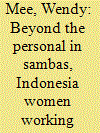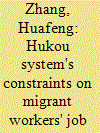|
|
|
Sort Order |
|
|
|
Items / Page
|
|
|
|
|
|
|
| Srl | Item |
| 1 |
ID:
132900


|
|
|
|
|
| Publication |
2014.
|
| Summary/Abstract |
Sambas, a regency in Indonesia's West Kalimantan Province, on the border with Sarawak (Malaysia), provides a distinctive borderlands perspective from which to evaluate the economic and social transformations that accompany Indonesian women's labor mobility. Drawing on village surveys and case studies about women's cross-border activities in Sambas, this article examines the complex inter- section between women's working lives and economic sectors, including those conventionally labeled formal, informal, subsistence, and capitalist. The increasing involvement of young Indonesian Malay women in labor migration has also fostered new marital and familial patterns, which may in turn generate further shifts within the organization of cross-border work and family in the future. These changes illuminate issues of agency and precedence that arise out of local economic histories and family patterns of labor and labor migration. This analysis of both continuities and transformations in women's cross-border labor leads us to attend to women's creative engagement with the opportunities and constraints they face in reaching their personal and economic aspirations. One opportunity, this study shows, was women's proximity to an international border. This location they turned into an economic asset, one that harnessed the productive power of the border.
|
|
|
|
|
|
|
|
|
|
|
|
|
|
|
|
| 2 |
ID:
101273


|
|
|
|
|
| Publication |
2010.
|
| Summary/Abstract |
This article highlights the case of a rural north-east Chinese village where youth labour mobility is a marriage strategy deployed by parents and engaged in by young people given constraints on education and income in the countryside. While some rural mothers and their daughters do make the fairytale of "marrying-up" into an urban household come true, for most rural young women migrants the self-oriented consumption that they are encouraged to pursue free of rural domestic responsibilities sets them up for heartbreak when they are brought back for a rural marriage. As long as rural households are left to rely on the "insurance" of land and a younger generation to work it and provide labour of domestic subsistence, they will pull sons (and wives for them) back to the countryside, and try to marry daughters to urban households to expand their network of security. This new twist on an old managerial strategy sets up a tragic conflict: young men are encouraged to return to the countryside, while young women are pushed to provide a "uniting bridge" into the city and, when they fail, are brought back to the countryside for marriage. If the experiences of families in Huangbaiyu village are not an anomaly but signal a broader trend, a generation of returnee young women who are frustrated and angry in rural marriages and abandon their husbands and parents-in-law will dramatically influence the future of China's development.
|
|
|
|
|
|
|
|
|
|
|
|
|
|
|
|
| 3 |
ID:
093842


|
|
|
|
|
| Publication |
2010.
|
| Summary/Abstract |
Most studies on discrimination against migrants in Chinese cities focus on wage differentials. This paper endeavours to develop an alternative way of explaining the institutional discrimination against migrants by studying workers' job mobility rates in three cities: Beijing, WuXi and Zhuhai. Migrants are commonly perceived to have high occupational mobility; however, Cox proportional hazards regressions in this paper show a different picture. Institutional discrimination reduces the number of jobs available to the migrants, increases their job search costs and the cost of losing jobs. Even though migrants take jobs unacceptable to local residents, the effects of this institutional discrimination still constrain migrants in changing jobs. The regressions show that temporary migrants have longer job durations and shorter unemployment durations than local people or permanent migrants. Moreover, migrants start to change jobs more often only after they have stayed in the city for some time and have accumulated enough assets to be able to survive when unemployed.
|
|
|
|
|
|
|
|
|
|
|
|
|
|
|
|
| 4 |
ID:
167580


|
|
|
|
|
| Summary/Abstract |
We observe and analyse three intra-industry foreign direct investment (FDI) spillover transmission channels using unique firm-level data collected from on-site interviews and observations regarding domestic and foreign firms operating in Uganda in 2015. Our main results are: (1) the spillover effects mainly depend on the channel(s) by which they occur (the competition channel is most important while spillover benefits through the worker mobility and the imitation channels are less prevalent) and (2) both positive and negative spillover effects occur within the same channel and, moreover, effects differ by channel for the same case. These are novel and challenging findings that have not yet been recognised in theoretical and empirical research on FDI spillovers. Our results suggest that long-term pecuniary spillover effects are predominantly stimulated via the competition channel and show that only limited short-term and long-term technological spillover effects occur through the imitation and the movement of workers channels. These channels are not only less prevalent, but also appear to be constrained by competition-determined spillovers. We are confident that these directions for future research will have a high pay-off because, as shown by this exploratory fieldwork, a more complete picture of the spillover effects is reached when the channels are considered simultaneously.
|
|
|
|
|
|
|
|
|
|
|
|
|
|
|
|
| 5 |
ID:
124727


|
|
|
|
|
| Publication |
2013.
|
| Summary/Abstract |
Canada and the European Union (EU) began negotiating a comprehensive economic and trade agreement (CETA) in May 2009. The authors survey both the process and the content of CETA from the perspective of the province of Quebec. For the first time, Canadian provinces and territories have fully participated in international trade negotiations that will impact them directly and engender important economic benefits. CETA will ensure that Canadian provinces and territories obtain real market access for their goods and services to the EU's 500 million consumers. It will encourage and increase foreign investment as well as create further labour mobility between Canada and the EU. Quebec will benefit from a growing and deeper relationship with the EU through trade and cooperation, thereby fostering economic globalization and integration.
|
|
|
|
|
|
|
|
|
|
|
|
|
|
|
|
|
|
|
|
|